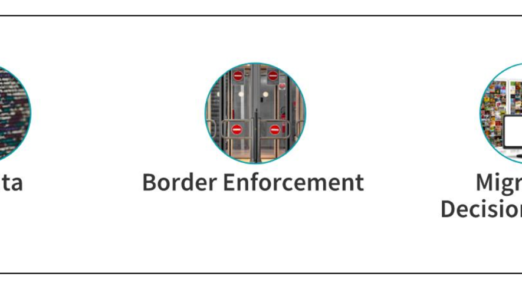Our work
EDRi is the biggest European network defending rights and freedoms online. We work to to challenge private and state actors who abuse their power to control or manipulate the public. We do so by advocating for robust and enforced laws, informing and mobilising people, promoting a healthy and accountable technology market, and building a movement of organisations and individuals committed to digital rights and freedoms in a connected world.
Filter resources
-

The human rights impacts of migration control technologies
This is the first blogpost of a series on our new project which brings to the forefront the lived experiences of people on the move as they are impacted by technologies of migration control. The project, led by our Mozilla Fellow Petra Molnar, highlights the need to regulate the opaque technological experimentation documented in and […]
Read more
-

Dangerous by design: A cautionary tale about facial recognition
In this fifth and final installment of EDRi's facial recognition and fundamental rights series, we consider an experience of harm caused by fundamentally violatory biometric surveillance technology.
Read more
-

Double legality check in e-evidence: Bye bye “direct data requests”
After having tabled some 600 additional amendments, members of the European Parliament Committee on Civil Liberties (LIBE) are still discussing the conditions under which law enforcement authorities in the EU should access data for their criminal investigations in cross-border cases. One of the key areas of debate is the involvement of a second authority in […]
Read more
-

Digitalcourage fights back against data retention in Germany
On 10 February 2020, EDRi member Digitalcourage published the German government’s plea in the data retention case at the European Court of Justice (ECJ). Dated 9 September 2019, the document from the government explains the use of retained telecommunications data by secret services, the question whether the 2002 ePrivacy Directive might apply to various forms […]
Read more
-

Cloud extraction: A deep dive on secret mass data collection tech
Mobile phones remain the most frequently used and most important digital source for law enforcement investigations. Yet it is not just what is physically stored on the phone that law enforcement are after, but what can be accessed from it, primarily data stored in the “cloud”. This is why law enforcement is turning to “cloud […]
Read more
-

Data protection safeguards needed in EU-Vietnam trade agreements
On 12 February 2020, the European Parliament gave consent for the ratification of the EU-Vietnam trade and investment agreements. The trade agreement contains two cross-border data flow commitments. The related data protection safeguards in this agreement are similar to the ones in the EU-Japan agreement, which entered into force in February 2019. Civil society organisations […]
Read more
-

ECtHR: Obligation on companies to identify all phone users is legal
On 30 January 2020, the European Court of Human Rights (ECtHR) issued its judgment on the Breyer VS Germany case.
Read more
-

AG’s Opinion: Mass retention of data incompatible with EU law
Read more
-

#PrivacyCamp20 happened
Read more
-

EDRi-gram 18.2, 29 January 2020
"We've all heard the saying: 'If the product is free, then you're the product'"
Read more
-

CJEU to decide on processing of passenger data under PNR Directive
On 20 January 2020, the District Court of Cologne, Germany, submitted to the Court of Justice of the European Union (CJEU) the question whether the European Passenger Name Record (PNR) Directive violates fundamental rights. EDRi member Gesellschaft für Freiheitsrechte (GFF, Society for Civil Rights) initiated the proceedings against the directive, which allows for authorities to […]
Read more
-

Stalked by your digital doppelganger?
In this fourth installment of EDRi’s facial recognition and fundamental rights series, we explore what could happen if facial recognition collides with data-hungry business models and 24/7 surveillance.
Read more
